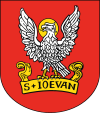Oels
| Oleśnica | |||
|---|---|---|---|

Wrocław Gate
|
|||
|
|||
| Motto: Miasto wież i róż "A Town of Towers and Roses" |
|||
| Coordinates: 51°12′N 17°23′E / 51.200°N 17.383°E | |||
| Country |
|
||
| Voivodeship | Lower Silesian | ||
| County | Oleśnica County | ||
| Gmina | Oleśnica (urban gmina) | ||
| Established | 13th century | ||
| Town rights | 1255 | ||
| Government | |||
| • Mayor | Michał Wincenty Kołaciński | ||
| Area | |||
| • Total | 20.96 km2 (8.09 sq mi) | ||
| Elevation | 150 m (490 ft) | ||
| Population (2006) | |||
| • Total | 36,951 | ||
| • Density | 1,800/km2 (4,600/sq mi) | ||
| Time zone | CET (UTC+1) | ||
| • Summer (DST) | CEST (UTC+2) | ||
| Postal code | 56-400 | ||
| Area code(s) | +48 71 | ||
| Car plates | DOL | ||
| Website | http://www.olesnica.pl | ||
Oleśnica [ɔlɛɕˈɲit͡sa] (German: Oels) is a town in Lower Silesian Voivodeship, in south-western Poland. From 1975–1998 it was in former Wrocław Voivodeship. It is the administrative seat of Oleśnica County and also of the rural district of Gmina Oleśnica, although it is not part of the territory of the latter, the town being an urban gmina in its own right.
The town's name comes from Polish olsza ("Alder"); Olcha is an Old Slavic word for this common plant and tree. On 22 February 1255 the Silesian duke Henry III the White, son of the Polish High Duke Henry II the Pious, vested civitas nostra Olsnicz ("our town Oleśnica") with town privileges.
The town is situated in the Silesian Lowlands east of the Trzebnickie Hills, part of the historical region of Lower Silesia. Located about 30 kilometres (19 mi) northeast of the Silesian capital Wrocław, it has been a stop on an important trade route to the Greater Poland region, Kalisz, Łódź and Warsaw; it had close ties with Kraków via Namysłów in the east. It was the site of an important printing press and gymnasium. From the 13th century, it had a coin mint.
...
Wikipedia


